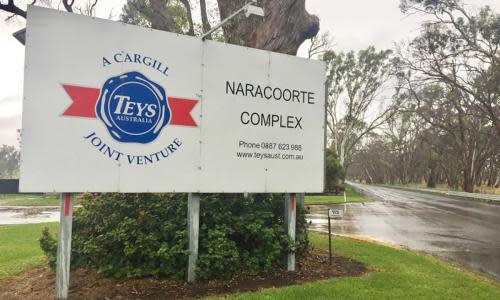Unions say exemption to allow Covid-positive people to work at SA meatworks sets ‘dangerous precedent’

An exemption issued to a South Australian meatworks to allow Covid-positive staff to continue working creates a dangerous precedent for other firms eager to operate even as case numbers soar, the head of Australia’s unions says.
Teys Australia abattoir near Naracoorte, which supplies beef to supermarket giant Woolworths, operated for several days before closing on Thursday even after at least 140 of its nearly 400 staff tested positive for Covid.
SA Health issued an exemption to allow infected staff to work if they were asymptomatic, but one employee said some sick staff had worked despite showing symptoms.
“I’ve seen unwell people still come to work,” the employee, who also contracted Covid, said, speaking on condition of anonymity because he was not authorised to comment publicly. “They still have a runny nose, they have coughs, they still have sore throats.”
Workers who tested negative in daily rapid antigen tests were given yellow hairnets to identify them, while Covid-positive workers wore white ones. That practice was “demeaning and dystopian”, the ACTU president, Michele O’Neil, said.
All meatworkers continued to use the same toilets and worked in common spaces, such as the boning room, without special air filters. Covid-positive workers wore face masks, balaclavas and gloves, the worker said.
“We have taken big risks for our co-workers and then the public,” the worker said, adding he had to isolate at home to minimise the risk of infecting his family.
Guardian Australia presented a detailed list of questions to the company and to SA Health and SafeWork SA.
“Teys is strictly guided by SA Health and its risk management requirements,” a Teys spokesperson said. “We are satisfied with the strong controls we have in place and continue to RAT test workers daily in accordance with SA Health guidelines.”
Earlier in the week, the official said SA Health had “approved a limited return to work for asymptomatic individuals in critical roles, on the condition they are feeling well and are isolated from other workers”.
The special exemption appears to have been issued because the abattoir, which slaughters more than 600 cattle a day, had a stockpile of dead animals that needed to be processed. Some 70% of the output is earmarked for export, with a large portion of the domestic supplies going to Woolworths.
The employee said the slaughtering is scheduled to resume on Monday and he expects a similar arrangement to continue allowing Covid-positive employees to return to work. About 90% of staff are overseas born, with the majority of them on temporary visas lately from Pacific nations such as Fiji, Vanuatu and Samoa, the worker said.
Email: sign up for our daily morning briefing newsletter
App: download the free app and never miss the biggest stories, or get our weekend edition for a curated selection of the week's best stories
Social: follow us on YouTube, Facebook, Instagram, Twitter or TikTok
Podcast: listen to our daily episodes on Apple Podcasts, Spotify or search "Full Story" in your favourite app
“The majority of workers are on work visas and of course they’re fearful,” the ACTU’s O’Neil said. “Their boss controlling their paycheque but also controlling their passport.”
The Naracoorte exemption is the only instance the ACTU is aware of in Australia where Covid-positive staff were being allowed back to work.
“It’s an outrageous approach because this company is actually culpable in terms of why they have an outbreak of this size,” she said.
“Instead of being punished and held to account for that, they’ve in fact received some sort of reward it would seem from SA Health for their own lack of safety at work for workers,” O’Neil said.
Related: PM’s response to Omicron staffing crisis falls short, Australian businesses and unions say
The exemption, though, set “a bad and dangerous precedent,” she said, because it risked spreading Covid further within the company and the local community.
“Woolworths must be held to account here as they are their major customer in Australia,” O’Neil said, adding that Teys’ activity would not sit well with its own Responsible Sourcing Standards.
A Woolworths spokesperson said the company expected “all of our suppliers to adhere to the Covid safety protocols set by their relevant state authorities”.
“We have been advised by Teys that an exceptional three-day arrangement was approved by SA Health, in response to circumstances at the plant,” the spokesperson said.
“We were not involved in the decision to introduce these temporary measures and are looking into the issues raised to ensure the labour standards we set for our suppliers have been met,” she said.
SafeWork SA itself is not able to send staff to inspect the site. The government authority issued a directive of its own two weeks ago barring its inspectors from sites with Covid outbreaks unless there is an injury or fatality.

 Yahoo News
Yahoo News 